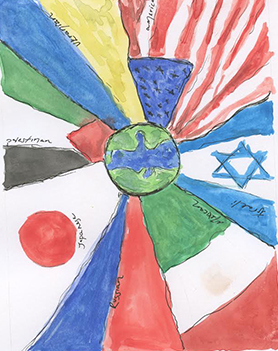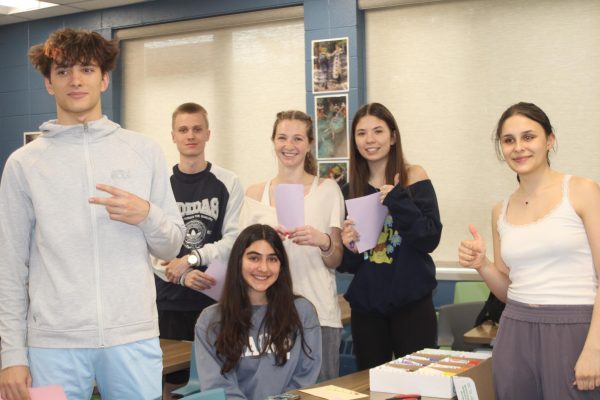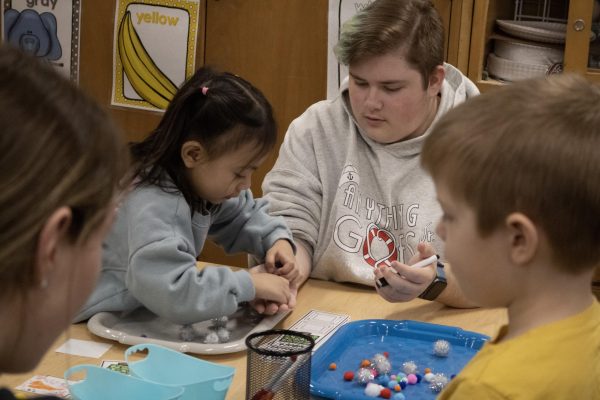Students reflect on mixed cultures, challenges, opportunities

Illustration by Grace O’Malley
February 1, 2016
America is a melting pot of cultures,with students at South coming from many different countries and experiencing different upbringings. From continent to continent, the unique cultural makeup helps to construct the diverse student body that South possesses.
According to Israeli-American Eden Krenzel, she is a co leader in South’s Israeli Club. Krenzel attributed the club to having broadened her learning about what it means to partake in Israeli culture. Krenzel also explained how she thinks that participants of this club are able to acquire new perceptions and for seek facts about Israeli culture, as she did participating.
“You learn new interesting things [in Israeli Club] and there’s a whole cultural aspect to it that’s definitely very interesting,” Krenzel said.
Similarly to Krenzel, sophomore Kelly Alvarado is biracial and takes part in American, Japanese, and Ecuadorian culture. Alvarado explained how she agrees that being part of multiple cultures has allowed her to better appreciate the perspective of each individual culture. According to Alvarado, she and her family went to Ecuador the summer of 2014. She recalls the feeling of gratitude upon coming back to America because of the institutions she took for granted in the US that were not promoted in Ecuador.
“[Coming back] from Ecuador I was way more thankful for even having a laundry machine and having my own bedroom […] so it definitely makes you more appreciative.” Alvarado said.
Alvarado also believes that being apart of many cultures helps to shape her identity. Both her Ecuadorian and Japanese culture impacts the characteristics she has, and what capabilities she can handle because of these cultures.
“In Japanese culture, there’s more politeness and manners and I kind of get that from my Japanese side,” Alvarado said. “Then from [my Ecuadorian side], I can do hands on things more, like […] knitting and making my own stuff.”
According to Krenzel, along with the benefits she has experienced in being a part of two cultures, difficulties and misperceptions come too. Krenzel explained how she has experienced stigma of being Israeli, and dislikes the thoughts perceived of Israelis as being violent towards Palestinians, as well as judging a culture by its stereotypes.
“Often times, [the media] make it out that Israelis are very bad, and they kill Palestinians […] when in reality, there are people who are very good friends with [Palestinians], and there’s a good relationship,” Krenzel said. “[…] There are often biases and stereotypes that we grew up living within society and tend to not see the other side of [Israeli] culture or of this society so keep an open mind and give any culture a try really, because you might discover completely different from what you had thought.”
Similarly to Krenzel, sophomore Angela Golota also experiences Russian stereotypes due to her cultural ties. However, Golota explained that for her, the stereotypes deem to fit her personality rather than blatantly go against, as they did for Krenzel.According to Golata, Russian stereotypes have proved to influence her personality because of specific stereotypes targeted towards her.
“I know there is a stereotype that Russian people are very straightforward and that they don’t hold back opinions and I feel like I belong in that category because I’m very straightforward […],” Golota says.
Along with stereotypes, another difficulty Golota experiences being apart of two cultures is that it is often times challenging to build and sustain a strong relationship with family members still living in Russia.
“It’s really difficult,” Golota said. “My uncle and I only Skype when I’m over at my grandma’s house to visit my cousins and the time zones are really different, so that messes up the time we can talk.”
Sophomore Victoria Fedorko explained that her family immigrated from Ukraine to America for better opportunities before she was born. Because of this, Fedorko believes that the United States has been a haven to many immigrants around the world.
“In Ukraine, it’s a much more poverty stricken country, at least nowadays, and […] America has a lot more opportunities college wise,” Fedorko said.”Ukraine does not have a lot of college opportunities and much less job opportunities.”
Similarly to Goloto, Krenzel affirmed that although it can be difficult trying to fit into both the American and Israeli culture but also that being a part of each at the same time has given her more of a worldly view. According to Krenzel, being both an Israeli and American has beneficial to how she views the world, and that being part of both cultures allows her to see things differently than most Americans.
“[Being an Israeli and an American], it makes you see the world in a different way,” Krenzel said. “There’s the American way of seeing the world, and there’s the different way: the Israeli way of seeing the world. Combined together, you get a whole different perspective of life, and you see things in a different way, like [having] two perspectives, and it expands your [mental] horizons.”













